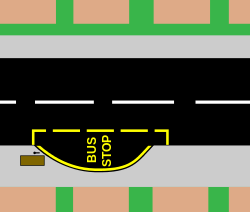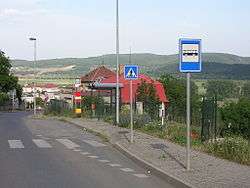Bus turnout
A bus turnout, bus pullout, bus bay, bus lay-by (UK),[1] or off-line bus stop is a designated spot on the side of a road where buses or trams may pull out of the flow of traffic to pick up and drop off passengers. It is often indented into the sidewalk or other pedestrian area.[2] A bus bay is, in a way, the opposite of a bus bulb. With a bus bulb, the point is to save the bus the time needed to merge out of and back into moving traffic, at the cost of temporarily blocking that traffic while making a stop. With a bus bay, the goal is to not block traffic while the bus is stopped, but at the cost of the time necessary to merge back into flowing traffic. Bus bays, therefore, will generally produce longer dwell times than bus bulbs.


The dwell time can be reduced by traffic legislation. E. g. in the Czech Republic, the drivers in the running traffic lane are obliged to enable to the bus to leave the bus stop, but this obligation applies only in built up area. The Czech technical standards from 1970s and 1990s (ČSN 73 6425) preferred to build bus bays at all classes of roads, the new version ČSN 73 6425-1 from 2007 prefers bus stops in the running lane within traffic calming concept. On roads of higher classes, bus bays or bus stop lanes are obliged.
References
- Bus Stop Design Guide (PDF). Northern Ireland Planning, Govt. of UK. October 2005. Retrieved 18 March 2015.
- "Bus Handbook, Sharing the road , Municipal bus bays". Ministry of Transportation, Ontario. 27 August 2013. Retrieved 18 March 2015.
| Wikimedia Commons has media related to Bus bays. |